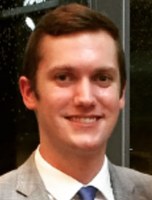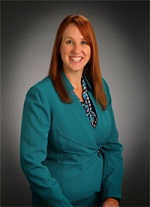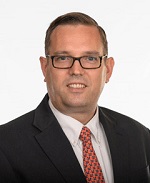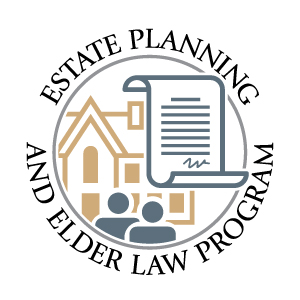 Matthew Burnett is a member of the Estate Planning and Elder Law Program's Advisory Board. He is an associate attorney with Thomas, Dodson & Wolford PLLC. His practice focuses on estate planning and estate administration. Burnett was a student of Professor Maynard and assisted him in launching the Estate Planning & Elder Law Program in 2016.
Matthew Burnett is a member of the Estate Planning and Elder Law Program's Advisory Board. He is an associate attorney with Thomas, Dodson & Wolford PLLC. His practice focuses on estate planning and estate administration. Burnett was a student of Professor Maynard and assisted him in launching the Estate Planning & Elder Law Program in 2016.
First, the bad news: Your sweet grandmother has passed away at the age of 90. Now, the more uplifting news: Your grandmother has kindly decided to leave at her death $100,000 to be held in trust for your benefit.
Though your grandmother worked tirelessly for her entire life, years of nursing home care have significantly depleted her assets. Your grandmother thought it best to name a bank to serve as a corporate trustee, given that banks are highly regulated and staffed with professionals who work with trusts regularly. As well-intentioned as your grandmother may have been, this might not necessarily be the most efficient way for your grandmother to pass her wealth to you.
First, many banks charge trustee fees which can limit the growth potential of the trust assets. Second, trustees must also adhere to the “Prudent Investor Rule.” This rule dictates that trustees should manage and invest trust assets prudently. Again, this may limit the growth potential of the assets left to you in trust. Last, requesting distributions from a corporate trustee can be a time-consuming and sometimes frustrating ordeal. Depending on how your grandmother drafted the language of her trust agreement, you may only be permitted distributions of trust assets in very specific circumstances (e.g. for health reasons). When requesting a distribution, you must demonstrate to the bank that your circumstances permit such a distribution. This can require time and considerable persuasiveness on your part as the beneficiary. The bank might not always permit distributions when you request them.
Enter the Uniform Trust Code (UTC). The UTC allows beneficiaries of trusts similar to the one above to terminate such a trust due to the trust being “uneconomic.” The drafters of the UTC understood that fees and other costs of administration as to a trust holding fewer than $100,000 of assets quickly make such a trust “uneconomic.” In short, the UTC allows smaller trusts to terminate and be distributed outright to beneficiaries so that they may use the funds in a more efficient, economic manner.
Kentucky adopted its version of the UTC in 2014. The UTC — initially drafted by the National Conference of Commissioners on Uniform State Laws (NCUSL) in 2000 — exists to provide “precise, comprehensive, and easily accessible guidance on trust law questions.”
Prior to the adoption of the UTC, most states turned to decades-old case law for guidance on trust law. Aside from the clarity which comes with the adoption of modern uniform codes, Kentuckians will now also enjoy the benefit of a statutory scheme which grants considerable flexibility during the administration of a trust.
Yet another area in which the UTC has given much-needed flexibility is that of trust modification. Imagine yet again that your grandmother has decided to name you as a beneficiary of a trust that will be funded at her death. This time, your grandmother bequeathed to you a generous $200,000. Further, to ensure that the fund will grow so that it can provide you with income for the rest of your life, your grandmother states that you may not receive distributions of trust principal until the age of 50 unless such a distribution is done for a medical emergency.
Now imagine that you are a young adult saddled with significant debt, be it student loans or a mortgage (an all-too-real scenario for many of you reading this, I presume). Such debt often carries high interest rates. To combat the burden of accrued interest, it behooves you — the debtor — to pay off those debts as quickly as possible. Unfortunately, though your grandmother left you quite the nest egg, you generally are unable to apply any of that principal toward paying off your debts. Interest on those debts will accrue for many years and you will ultimately be forced to apply more trust assets toward that debt interest than you would if you could use some of that trust principal to pay off the debt immediately.
Yet again, the UTC offers a solution. Though the trust agreement has been made irrevocable due to your grandmother’s passing, there exists a way to modify the trust in order to best preserve assets for future growth. In the circumstance described above, the UTC permits a modification of the trust agreement so long as that modification is not inconsistent with a material purpose of the trust. Assuming a material purpose of your grandmother’s trust is to provide you with income for the rest of your life, it follows that modifying the trust to prevent unnecessary expenditures on debt interest would not be inconsistent with such a material purpose. In all likelihood, such a modification would be granted by a District Court Judge.
Trusts come in many different shapes and sizes. Historically, adjusting and adapting trusts to changed or unexpected circumstances proved to be difficult. Inherent flaws and inefficiencies in the trust agreement often went unmodified and as a result, countless dollars were wasted. The Uniform Trust Code offers much-needed flexibility to help combat issues which unexpectedly arise during trust administration.
 My name is Misty Clark Vantrease and I am a partner at Kentucky ElderLaw, PLLC and a member of the Advisory Board for EPEL. I graduated from the Brandeis School of Law at the University of Louisville in 2001 and have focused my practice entirely on elder law since 2011. When someone asks my seven-year-old son what lawyers do, he says they help people. Some might argue whether that’s true, but for me in own life, I really believe it is. During my time in law school, that was what I was searching for — a way to help.
My name is Misty Clark Vantrease and I am a partner at Kentucky ElderLaw, PLLC and a member of the Advisory Board for EPEL. I graduated from the Brandeis School of Law at the University of Louisville in 2001 and have focused my practice entirely on elder law since 2011. When someone asks my seven-year-old son what lawyers do, he says they help people. Some might argue whether that’s true, but for me in own life, I really believe it is. During my time in law school, that was what I was searching for — a way to help.
I started my career as a public defender and spent the first 10 years handling felony — and eventually death penalty — trial work. This was both demanding and rewarding. Things change, though. Life has a funny way of doing that.
In 2010, I found myself about to become a mother and struggling to help take care of my own aging parents who I had moved up from far Western Kentucky to live near me. My father is a disabled veteran who has had strokes, two open heart surgeries, diabetes and significant mobility impairment. While my mom is in great health, the role of caregiver has and is taking its toll on her. Next month, they will celebrate their 59th wedding anniversary and they are, and will always be, inseparable.
As I struggled with these new roles in my own family, I was offered the opportunity to work for Bernard Faller. Bernie graduated law school with me when he was 55 years old. I was 25. He found his calling by striking out on his own in this new area of “elder law.” It was somewhat novel in Kentucky and certainly no one had devoted an entire practice to it. He branded his firm Kentucky ElderLaw and it took off.
Under his tutelage, I learned the skills I needed for the technical navigation of Medicare, Medicaid and VA, along with general estate planning. I also drew from my own personal experiences. I was living what my clients were living in many ways. I could share with them, cry with them, truly empathize with them. When Bernie retired in 2013, I took over the firm with my partner, Kelly Gannott. We now have six lawyers.
My days are long and there are times where I am unbelievably saddened by the loss and pain so many of my clients are experiencing. The cruelty of disease, particularly those that rob us of our memories, is heartbreaking. No matter what, however, I’m glad to be there. I hold their hands. I try to shine light where there is darkness. I give them a shoulder to cry on. I am their voice when they don’t even know what to say. Every day, I want to be that for anyone I can help.
For me, elder law is more than the way I make my living. It’s a joy. Oh — I also get hugs. Lots and lots of hugs.
More later!
Misty Vantrease
 R Jonathan Raymon is vice president and trust specialist with Hilliard Lyons Trust Company LLC. He is a member of the Estate Planning and Elder Law Program's advisory board.
R Jonathan Raymon is vice president and trust specialist with Hilliard Lyons Trust Company LLC. He is a member of the Estate Planning and Elder Law Program's advisory board.
Here, he shares insights on a common problem encountered in estate planning.
A common problem when devising an estate plan is creating a distribution which treats all children and grandchildren fairly.
If all of a decedent’s children are alive at the time of distribution, the solution is usually fairly straightforward and all the children can receive shares equally, or “per capita.”
However, if one of the decedent’s children is deceased and has children of his or her own (i.e., grandchildren of the decedent) then the distribution is a bit murkier. If a grandchild were to receive a per capita share of the estate, the grandchild would not only receive the same dollar value as a living child, but the possibility of multiple grandchildren could erode the share that a child would have otherwise received. Alternatively, if the estate is divided only among the living children, then some grandchildren might be completely left out of the good fortune of the estate.
The frequent solution is often referred to in shorthand by the Latin phrase “per stirpes,” meaning “by branch.”
In a per stirpes distribution, the value of the estate is divided into shares for each child who is either alive at the time of distribution or is survived by descendants. The share that would have gone to the deceased child would then be split in a similar fashion for any of his or her children.
For example, if a decedent had three children, but one of whom is already deceased leaving two of his own children, then the two surviving children would each receive one-third of the estate and the children of the deceased child (i.e., grandchildren of the decedent) would each receive one-sixth of the total estate. Although the grandchildren whose parents are still alive would not directly receive anything at the distribution of the estate, one would expect that they would benefit indirectly through their parents.
Because it is never possible to know who will survive a decedent at his or her death, a per stirpes distribution offers a simple approach to guarantee that each “branch” of a family is treated equally. This can be particularly helpful in beneficiary designation forms for IRA and other transfer-on-death (TOD) accounts, which may otherwise appear very limiting in allowing for contingent distributions.
Each state has statutes which further define how a per stirpes distribution occurs if the will or trust is silent; for example, a statute will describe how adopted or step-children are treated. Nevertheless, historically the term per stirpes has been used for centuries and is an established method to describe the distribution of an estate.

- Community members attended the Elder Law Symposium.
Representatives from Kentucky ElderLaw, KentuckyOne Health, ElderServe and the University of Louisville’s Institute for Sustainable Health & Optimal Aging were all in attendance at the Estate Planning and Elder Law Program's third annual Elder Law Symposium.
The Sept. 15, 2018, event was held at Louisville's Southern Star Baptist Church.
The event was attended by about 25 community members, nine law students and four alumni of the University of Louisville School of Law.
Metro Councilwoman Jessica Green and Judge Denise Brown also came to speak about various issues in elder law.
Community outreach is one the main goals of the Estate Planning Elder Law Program, so it was fantastic to see such a great audience at the Symposium.
— Joe Zurschmiede, EPEL research assistant

- Alex Hisle
For many attorneys, their clients seek legal assistance on the worst day of their lives. I saw this first-hand when my mother unexpectedly lost her vision to a brain tumor at 32 years old. While the rest of my family was focused on how my mother’s disability affected them, her attorney could empathize with her and restore her self-worth. While he could not turn back time or cure the blind, he improved her quality of life and independence by assisting her with drawing disability and signing up for Medicare.
My mother's story has inspired almost every step that I have taken to get to law school. I am pursuing a law degree so that I may pay forward the kindness that my mother received on the worst day of her life. Growing up with and caring for a disabled parent has made me aware and empathetic of the specific legal needs of senior citizens and people with disabilities and special needs. I think it is important to be prepared for the unexpected and go to someone when the unexpected can take over your daily life. I think that elder law is the way I can help clients, caretakers and loved ones on the worst day of their life.

- Joe Zurschmiede
My interest in EPEL stems from both of my grandparents dying intestate and the terrible experience my family had with the probate process. I want to help individuals plan for the future so they don’t have to go through what my family did. Additionally, I graduated from college with a bachelor’s degree in finance, with a primary focus on investments and real estate. I’m very interested in different investment strategies individuals can use to plan for retirement and other financial goals. My prior education gave me a passion to help others plan for the future, as well as plan for after death.
Outside of school, I enjoy spending time with family and sporting events. Even though the past few years hasn’t been so good, I like to watch the Cincinnati Reds any chance I get.
I am looking forward to being a part for EPEL. I know this will be a great experience to learn and to help many people.

- Mashayla Hays
My focus as an EPEL research assistant is elder law abuse.
I have been researching the current initiatives that Kentucky has in place to prevent and protect elder citizens from abuse and neglect.
Kentucky currently has a lot of initiatives and programs for the “after abuse” situations but is lacking some initiatives in the front end of this critical issue. This lead me to look outside of Kentucky to see if other states have been able to find a potential solution and see how they handle these types of concerns.
Myself along with four other elder law students are researching states in the same region of Kentucky including West Virginia, Virginia, North Carolina and Tennessee. I will be looking over the students' findings in the upcoming weeks and creating a memo with suggestions for what EPEL can focus on next year to help ensure that Kentucky continues to make progress in preventing elder law abuse.

- The Estate Planning and Elder Law Program hosted its first Elder Law Awareness Day on March 5, 2018.
The Estate Planning and Elder Law Program held its first Elder Law Awareness Day on March 5, 2018. We had a day full of events that focused on career opportunities and current initiatives in elder law.
First, we started with information booths from local vendors. The informational booths were a great way to expose the students to the various issues that the elderly encounter.
The Thrive Center, a nonprofit technology, innovation and educational center, came and showed students how technology and assistive devices can aid the elderly.
New Roots explained to students how community gardens could be used as a resource for the elderly to receive homegrown groceries.
Hosparus informed students on the administration of hospice and end of life care.
AARP and the Kentuckiana Regional Planning & Development Agency informed faculty and students on various frauds and schemes that affect the elderly and programs they are instituting to help protect those that are vulnerable.
UofL's Institute for Sustainable Health and Optimal Aging also shared a booth that showed students how we can address issues while we age to make the process easier on all involved.
The booths were rounded out by Pearson Funeral Home, which informed us on funeral planning and how pre-arranging your funeral could save time and money when you pass.
Next, we had a lunch panel discussion about elder law career opportunities. The panel provided an opportunity for students to hear and ask questions about career opportunities in elder law. The panel included:
- Dr. Anna C. Faul and Dr. Joseph G. D’Ambrosio, University of Louisville
- Kelly Gannott, partner at Kentucky ElderLaw PLLC
- Jessica Elkin, KIPDA
- Justin Magnuson, Institute for Sustainable Health and Optimal Aging
- Carol Challas, The Thrive Center
- Gerina Withers, Office of Senior Protection and Mediation
- Michelle Rudvoich, Office of Medicaid Fraud and Abuse
Students were able to learn about the different challenges faced from each panelist and how they advocate and help push policy and initiatives forward to help advance the future of elder law.
Finally, we ended our event with a presentation and Alzheimer's simulation thanks to the Institute for Sustainable Health and Optimal Aging. The presentation focused on how Alzheimer's occurs. Students were able to learn how the symptoms affected those who have Alzheimer’s and ways to help accommodate loved ones diagnosed with the disease. The simulation allowed students to feel those symptoms first-hand as they were outfitted with tools to mimic the symptoms of someone suffering from Alzheimer's and instructed to complete five specific tasks that someone unaffected could complete in six minutes. The students were only able to accomplished two of those tasks in the time allotted. It was a great exercise that taught just how difficult it is to live with Alzheimer’s, and the students really enjoyed the eye-opening experience.
Our first Elder Law Awareness Day was a success. The Estate Planning and Elder Law program greatly appreciates all of the organizations who took time out of their days to help put together such an amazing program.

- Seth Todd
My name is Seth Todd and I am a 3L research assistant for the Estate Planning and Elder Law Program.
Outside of school and work, I enjoy playing with my dogs, traveling and attending concerts. My interest in estate planning was sparked while interning for Hilliard Lyons Trust Company. I realized just how important having proper estate planning documents was to aging. This also happens to be something that most people don’t have in place!
If you don’t have proper documents in place, especially in Kentucky, you are essentially leaving everything up to the government and the courts. Personally, I try to have the government and the courts involved in my life as little as possible. Knowing that they could have a say in who controls my assets while I am incapacitated or after I pass doesn’t sit well with me.
I recently heard that one in two people will have severe Alzheimer’s disease by the time they are 85. Think about that: Based on the numbers, you or your spouse will have Alzheimer’s disease. Even more mind-boggling is that if you do not have a proper power of attorney in place, a judge will appoint a guardian who will essentially have control over your affairs. While we like to think the government always has our best interests in mind, I would not like to leave that to chance! This is just one of the reasons I believe everyone should have proper estate planning documents in place.
Keep checking back to stay up to date on the happenings of EPEL, and how we are combatting today’s issues in estate planning and elder law.

- Goldburn P. Maynard Jr. is the director of the Estate Planning and Elder Law Program.
Welcome to the Estate Planning and Elder Law Program Blog. It’s a privilege to lead this new imitative to connect with the university and the community beyond. I am extremely excited about the work we are doing in the program and we have exciting plans for educational sessions, research and outreach to the community.
First, I should admit that it was never my dream to work on these issues. While my interest in estate planning arose organically through my work as a tax attorney, elder law came into my life through life circumstances. When my mother died in 2014, my then 93-year-old dad came to live with me.
I quickly found out that despite my experience as a lawyer, I had no experience navigating the labyrinth that is government services and medical insurance. This area of law was too important to be neglected: I had to add it to my teaching and research portfolio. After a long and wonderful life, my father passed away last year. He continues to inspire my work by spurring me to be more ambitious about our work at the University of Louisville.
In the coming weeks and months, we look forward to introducing you to the people that work with EPEL and their efforts to make a difference. Ultimately, the issues of late life will affect all of us in some way. It will take sustained levels of creativity, ingenuity and commitment from diverse voices over time to improve the life of those in their advanced years.

- Miranda Robinson
The (short) explanation as to how I came to be an RA for EPEL is two-pronged. Initially, when I heard about the program, I was reminded of personal experiences with advanced planning — or the lack thereof. I saw first-hand how difficult it can be for families when the necessary planning documents are not in place. Additionally, I have always been interested in health care — oddly enough, it is ultimately why I chose to go into law. While certain legal documents like advanced directives and living wills are necessary for the elderly, they are applicable, and often essential, in the health care setting, too.
When I am not at school or work (I work as a law clerk at Dzenitis Newman, PLLC here in Louisville), you can find me playing with my dog, Lucy, or mountain biking at Cherokee Park! I am excited to begin researching advanced directives in Kentucky, how we as a state can make these documents more accessible and how Kentucky can increase its rates of estate planning.


